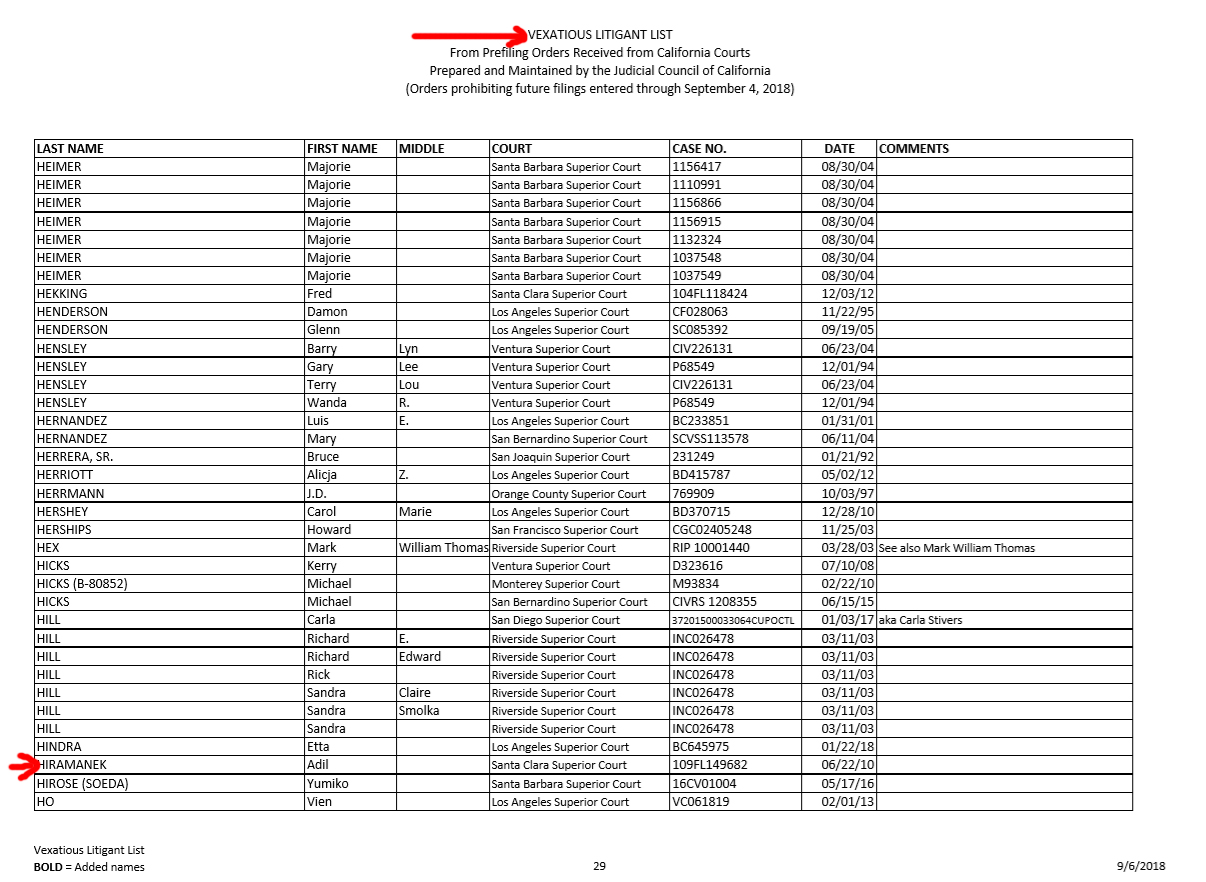 Lawzilla Additional Information: This page is locked by Lawzilla and not subject to the Own the Page policy.
Lawzilla Additional Information: This page is locked by Lawzilla and not subject to the Own the Page policy.
Case Name: Hiramanek v. Kapadia, et al.
Case No.: 2015-1-CV-278288
Defendant Adil Hiramanek moves “to transfer this case to an impartial judiciary as there is reason to believe that an impartial trial cannot be had herein, the convenience of witnesses and the ends of justice would be promoted by the chance, and there is no impartial judge of the court qualified to act.” (Mtn. to Transfer, p. 1:19-22, emphasis original.)
Mr. Hiramanek previously sought the same relief. On November 4, 2015, plaintiff Roda Hiramanek filed a motion to transfer this case, stating identically in her motion that she sought “to transfer this case to an impartial judiciary as there is reason to believe that an impartial trial cannot be had herein, the convenience of witnesses and the ends of justice would be promoted by the change, and there is no judge of the court qualified to act.” ([First] Mtn. to Transfer, p. 1:18-21.) Mr. Hiramanek filed a joinder in that motion on January 25, 2016, stating he “joins” and “seeks the same affirmative relief as Roda’s Motion.” (Notice of Joinder, p. 1:21-26, emphasis original.). This Court denied the motion in May 2016. As such, the instant motion by Mr. Hiramanek constitutes a renewed motion governed by Code of Civil Procedure section 1008, subdivision (b). (See California Correctional Peace Officers Ass’n v. Virga (2010) 181 Cal.App.4th 30, 43.)
Section 1008, subdivision (b) provides: “A party who originally made an application for an order which was refused in whole or part, … may make a subsequent application for the same order upon new or different facts, circumstances, or law, in which case it shall be shown by affidavit what application was made before, when and to what judge, what order or decisions were made, and what new or different facts, circumstances, or law are claimed to be shown.” Mr. Hiramanek neglected to file a code-compliant declaration; he failed to make any mention whatsoever in his moving papers of the prior motion that was denied. For this reason alone, the motion is improper. The motion otherwise lacks substantive merit.
Mr. Hiramanek’s motion is fundamentally predicated upon the existence of a lawsuit he and his mother filed in the United States District Court, Northern District of California, Case No. 3:13-cv-00228-JD, in which the Santa Clara County Superior Court (“Superior Court”) and certain person affiliated with the Superior Court are named as defendants. Mr. Hiramanek contends as follows in his motion: “It is fact that a conflict exists, which requires this Court to recuse itself. This court is in litigation, case#13-0228, titled Adil & Roda Hiramanek v. Superior Court of California, County of Santa Clara [‘SCSC’], L. Michael Clark, et al., before the Federal Court, Northern California District.” (Mtn. to Transfer/Memo. Pts. & Auth., p. 1:19-21.)
The prior motion was similarly based on the existence of that lawsuit. The factual basis in support of the prior motion was recited as follows: “It is indisputable that a conflict exists in this case which requires this Court to recuse itself. This court is in a pending litigation, #13-0228 RMW, case named Adil & Roda Hiramanek v. Superior Court of California, County of Santa Clara, L. Michael Clark, et al., before the Federal Court, Northern California Distirct-Exhibit A. [¶] In the ongoing Federal Court action, every employee of the Santa Clara County Superior Court, including its judges, personnel, et al., are not only the Federal Defendants, but are also disclosed witnesses, or potential witness, subject to deposition and trial testimony.” ([First] Mtn. to Transfer/Memo. Pts. & Auth., p. 1:3-10.) As indicated in this Court’s order on the motion, “the Hiramaneks [ ] mischaracterized the scope of the proceeding.” (Amended Order Re: Mtn. to Transfer, p. 3:11-14.) “Each employee and judge of the Superior Court simply is not a defendant, and naming the Superior Court as a defendant did not equate to suing each and every court employee or judge. The federal district court dismissed the bulk of the Hiramaneks’ claims pursuant to an independent review of their pleadings under 28 U.S.C. §1915(e), and allowed them to proceed against a discrete number of defendants on limited claims. No claims remain against any judicial officer of the Superior Court.” (Ibid. at p. 3:14-19, footnotes omitted.) This Court further found the Hiramaneks’ conflict of interest argument unpersuasive for the reasons articulated in its order.
In a seeming effort to distinguish the instant motion from the former, Mr. Hiramanek states “[a]t a recent Aug. 2016 Fed. Court trial on claim #35, SCSC counsel and his client admitted that it harbors ill will, prejudice and hatred against XCD.” (Mtn. to Transfer/Memo. Pts. & Auth., p. 1:22-23, emphasis original.) As an initial matter, claim #35 in the federal action simply does not involve the Superior Court. A review of the docket in that case reveals the claim pertains to an employee of the Sixth District Court of Appeal allegedly intentionally discriminating against the Hiramaneks by denying them access to a restroom. The jury rendered a verdict in favor of that employee, namely Beth Miller, and the court subsequently entered judgment in her favor. In any event, Mr. Hiramanek fails to present any admissible evidence to substantiate the purported admission made in the federal action.
Next, Mr. Hiramanek points out that the Sixth District Court of Appeal recently recused itself from hearing a number of matters pending before it in which he is an involved party, allegedly due to the existence of the above-referenced federal action. Citing the doctrine of stare decisis, Mr. Hiramanek insists that this Court must recuse itself from the case at bench since the Sixth District Court of Appeal recused itself from matters pending before it involving the Hiramaneks. Mr. Hiramanek’s reliance on that doctrine is misplaced.
“Under the doctrine of stare decisis, all tribunals exercising inferior jurisdiction are required to follow decisions of courts exercising superior jurisdiction.” (Auto Equity Sales, Inc. v. Superior Court of Santa Clara County (1962) 57 Cal.2d 450, 455.) “Decisions of every division of the District Courts of Appeal are binding upon all the justice and municipal courts and upon all the superior courts of this state, and this is so whether or not the superior court is acting as a trial or appellate court. Courts exercising inferior jurisdiction must accept the law declared by courts of superior jurisdiction. It is not their function to attempt to overrule decisions of a higher court.” (Ibid.) The Sixth District Court of Appeal’s determination of self-recusal simply does not qualify as a decision implicating the doctrine of stare decisis, and Mr. Hiramanek cites no legal authority supporting a contrary conclusion.
In sum, Mr. Hiramanek has not identified any new or different facts, circumstances or law warranting the relief sought. As this Court previously determined in connection with the prior motion, there is no basis for concluding that an impartial trial cannot be had before any judge in the Superior Court simply because the Hiramaneks filed a lawsuit against the entity and a limited number of judicial officers and employees.
In consideration of the foregoing, Mr. Hiramanek failed to demonstrate that he cannot obtain a fair and impartial trial in the Superior Court. The motion to transfer this case is therefore DENIED.
 Lawzilla Additional Information: This page is locked by Lawzilla and not subject to the Own the Page policy.
Lawzilla Additional Information: This page is locked by Lawzilla and not subject to the Own the Page policy.
We received the following threat and locked this page involving Adil Hiramanek:
“Please remove all defamatory postings that appear under my name Adil Hiramanek, as they contain information that is not factual, and also does not contain perspective from both sides.
Your defamatory and slanderous posting has caused me tremendous damage, and continues to cause damages, including loss of earnings. I have had several job offers that were withdrawn at the last minute when prospective employers found these defamatory postings on google search/on the web.
Please confirm removing them, failing which all options to pursue remedies against you personally, and your office, will be on the table
Thank you
Adil Hiramanek”
Lawzilla then ran a search for “Adil Hiramanek” on Google, which returned numerous lawsuits involving Adil Hiramanek:
From reviewing some of these cases we saw reference in a court order in Hiramanek v Clark to Adil Hiramanek being a vexatious litigant. Checking the State of California’s list of persons list of vexatious litigants we found that Adil Hiramanek is indeed on that list:




 Link to this page
Link to this page